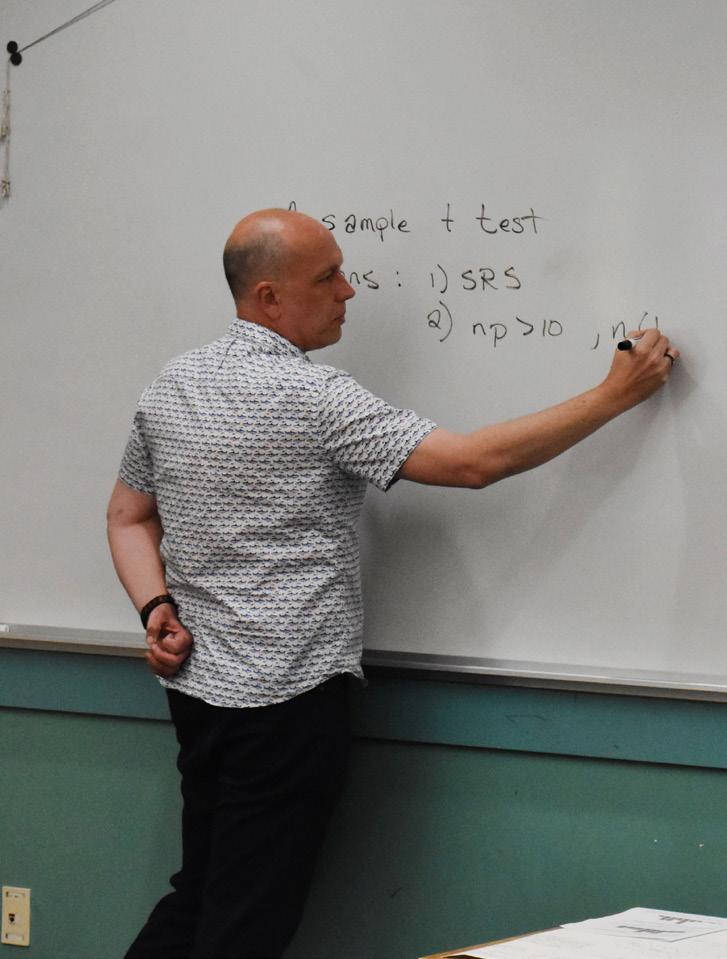
3 minute read
A senior reflects on senior reflections

tions, at least in their current state. This is not a personal attack on any senior who has shared a profound and deeply personal speech with the school community at an assembly.
Advertisement
I acknowledge how difficult it is to decide on a topic, write an eloquent speech, and deliver it to the entire Upper Division with ease and fluency. Nonetheless, my issue with senior reflections is not their quality, but rather their uniqueness and relevance to the Horace Mann community.
I cannot count the number of times I have heard the same mad-libbed senior reflection story — a student arrives at the school, bright-eyed and excited for the next years of a rigorous, academically invigorating education.
ingly fill-in-the-blank format of these reflections — I have spoken to many students who note a similar narrative emerging from every “unique story.”
Throughout my years at the school, I often received the same feedback in English class written next to my thesis: “why does this matter?” I never really got what this meant — if I made a connection between a symbol and a theme, how did I still have the burden of explaining why it matters? Didn’t I already do the analysis? I only understood what my teachers meant when I applied their logic to senior reflections.
I do not see a point to senior reflec-
With time, the “pressure-cooker environment” (a favorite phrase of senior reflectionists) gets to them, and provokes or accelerates the development of some personal issue. However, with the help of a good friend/teacher/mentor/(insert individual here), the student begins to love learning, enjoy school or crave academic rigor with a newfound appreciation developed and enhanced by their previous struggles. I know that I am not the only one who has noticed the seem-
The obvious rebuttal to my argument is that of course students at the same institution will have the same takeaways from their education — a critique of reflections for being too alike should instead be read as a critique of the school for putting so many students through universally arduous journeys. My response to this is that one school will naturally produce similar experiences for many students. That is a fundamental aspect of such a small, intense environment: to generate comparable stories of eventual success with every overworked student. I argue that it is not the school’s burden to ensure that seniors who give reflections have varying experiences at Horace Mann — that is an impossible burden to resolve. Instead, if a student is to give a senior reflection, that student should ensure that their story is 1) unique from others, and 2) highly relevant to the majority of the community. While quality and delivery are not points of weakness in most senior reflections, uniqueness and relevance are. It should be the responsibility of the individual writing and giving the speech to make it relevant to its listeners. It frankly borders on disrespectful to subject a theater of 500 high schoolers to your sob story about that honors math class you took or your season on the JV track team without having a significant message to impart. While hearing stories of an initial-failure-turned-academic-triumph may make us feel happy for the speaker or proud of our community, these stories do not share a meaningful message applicable to people that are not the speaker, nor do they provide unique insight on the school as an institution or what it is like to be a student here.
I would even venture to say that, based on the content of most reflections, most authors have not seriously or thoughtfully considered what they actually want their audience to learn from their reflection. The senior reflection should not be a self-indulgent retelling of the hardest four years of your life — it should impart some distinctive wisdom. It is a disappointment to students who expect a unique, thoughtful speech about the struggles you face and why they matter when they instead must listen to a 10-minute repetition of a story with which all students are familiar. We all know this school can be highstress and mentally exhausting. Tell us something new.
Given the current sad state of affairs, who should be giving reflections, and what should they be about?
I would like to believe that every student who volunteers for a reflection does so for a reason. The solution to the repetition pervasive among reflections is not to choose more unique or “interesting” people to give them.
It is to encourage reflectionists to share unique stories: discuss an aspect of their life or describe an experience at the school that no one else has yet shared.
Make senior reflections funny, or political, or controversial, or inspirational, or works of protest. Teach us something, tell us why it should matter to us. When faced with a choice between traditional and novel, Horace Mann students can and should choose the latter.









